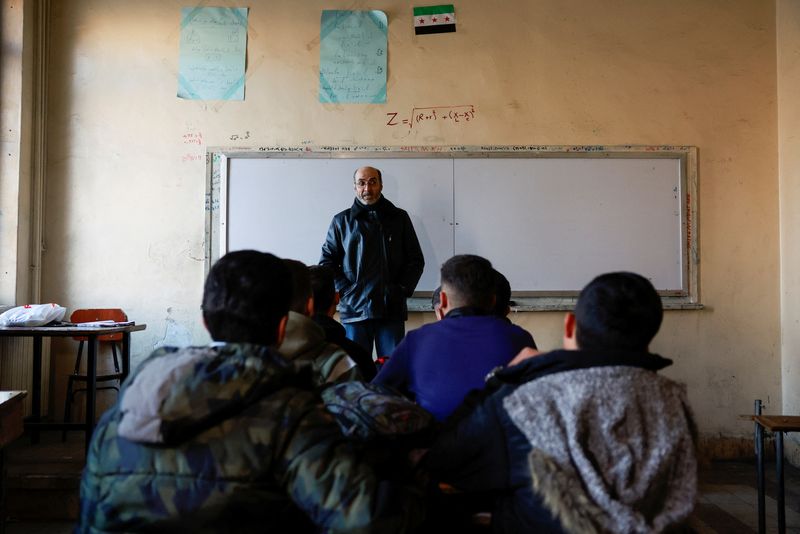
By Timour Azhari
DAMASCUS (Reuters) – Students returned to classrooms in Syria on Sunday after the country's new rulers ordered schools to reopen, a strong sign of some normalcy a week after opposition fighters overran the capital in their overthrow of President Bashar al-Assad.
The country's new de facto leader, Ahmed al-Sharaa, faces a huge challenge to rebuild Syria after 13 years of civil war that has killed hundreds of thousands of people. Cities have been bombed into rubble, the economy has been damaged by international sanctions, and millions of refugees still live in camps outside Syria.
Officials said that most schools will open across the country on Sunday, which is the first day of the work week in most Arab countries. However, some parents did not send their children to class due to uncertainty about the situation.
Students waited joyfully in the courtyard of a boys' secondary school in Damascus on Sunday morning, applauding as school trustee Raed Nasser hung the flag adopted by the new authorities.
Nasser said, “Everything is fine. We are fully equipped. We worked for two or three days to prepare the school with the necessary services for the safe return of students to school,” adding that Jawdat Al-Hashemi School was not damaged. .
In one classroom, a student taped the new flag to the wall.
Student Salah El-Din Diab said, “I am very optimistic and happy.” “I was walking in the street afraid that I would be conscripted into military service. I was afraid when I reached the checkpoint.”
As Syria begins to try to rebuild, its neighbors and other foreign powers are still working to come up with a new position on the country, a week after the collapse of Assad's government, backed by Iran and Russia.
End sanctions?
Al-Sharaa – known by his nom de guerre Abu Muhammad al-Julani – leads Hay'at Tahrir al-Sham, the Islamist group that ousted Assad from power last week. Hay'at Tahrir al-Sham is a group formerly allied with Al Qaeda that has been designated a terrorist organization by several governments, and is also subject to UN sanctions.
UN envoy to Syria Geir Pedersen said on Sunday that he hoped for a quick end to sanctions to help facilitate economic recovery.

“We hope to see a quick end to the sanctions so we can see a real mobilization around building Syria,” Pedersen said upon his arrival in Damascus to meet with the Syrian interim government and other officials.
US Secretary of State Antony Blinken said that senior diplomats from the United States, Turkey, the European Union and Arab countries met in Jordan on Saturday and agreed that the new government in Syria must respect the rights of minorities.





